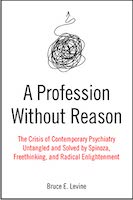Mark Twain famously said, “Suppose you were an idiot. And suppose you were a member of Congress. But I repeat myself.” My immediate reaction to Jon Ronson’s TED talk ? Imperialist psychiatrists, psychopathic corporatists—but I too repeat myself.
Ronson reminds us that the media’s poster boy for psychopathic corporatists in the 1990s was “Chainsaw” Al Dunlap. In the 2000s, the media’s poster boy for imperialist psychiatrists has been Joseph Biederman. You decide how much difference there is between imperialist psychiatrists and psychopathic corporatists.
Dunlap, the infamous “asset stripper” of the 1990s, cut 11,000 jobs as CEO of Scott Paper and walked away in 1995 with $100 million after Scott merged with Kimberly-Clark. “And,” Ronson reports, “he’d quite often fire people with a joke.”
Psychiatric imperialism? Ronson notes that “this is a country that over-diagnoses certain mental disorders hugely. Childhood bipolar—children as young as four are being labeled bipolar because they have temper tantrums, which scores them high on their bipolar checklist.” How did this happen?
Harvard psychiatrist Joseph Biederman, according to pediatrician and author Lawrence Diller, “single-handedly put pediatric bipolar disorder on the map.” Due in great part to Biederman’s influence, the number of American children and adolescents treated for bipolar disorder increased 40-fold from 1994 to 2003. And as Bloomberg News reported in 2007, “The expanded use of bipolar as a pediatric diagnosis has made children the fastest-growing part of the $11.5 billion U.S. market for antipsychotic drugs.” Today this market has grown to $18 billion.
Biederman’s relationships with drug companies was discovered by the public in 2008, when the New York Times reported the following about him: “A world-renowned Harvard child psychiatrist whose work has helped fuel an explosion in the use of powerful antipsychotic medicines in children earned at least $1.6 million in consulting fees from drug makers from 2000 to 2007 but for years did not report much of this income to university officials.”
As part of legal proceedings, Biederman was forced to provide documents about his interactions with Johnson & Johnson, the giant pharmaceutical company. In 2009, the New York Times reported Biederman pitched Johnson & Johnson that his proposed research studies on its antipsychotic drug Risperdal would turn out favorably for Johnson & Johnson—and then Biederman delivered the goods. In a deposition given by Biederman to several states attorneys, he was asked what rank he held at Harvard:
“Full professor,” Biederman answered.
“What’s after that?” asked one state attorney, Fletch Trammell.
“God,” Biederman responded.
“Did you say God?” Trammell asked.
“Yeah,” Biederman said.
Al Dunlap and Joseph Biederman share with the late mobster John Gotti (the “Dapper Don”) not only a certain grandiose sense of self-worth; all also brought attention to their deeds, embarrassing their fellow professional plunderers who would rather their business remain in the shadows.
In Al Dulap’s era, Newsweek ran a cover story “Corporate Killers: The Hit Men” (February 26, 1996) with mug shots of CEOs along with the number of jobs they had cut. Among the 12 severe offenders were Louis Gerstner, CEO of IBM (salary: $2,625,000, layoffs in July 1993: 60,000) and Edward Brennan CEO of Sears, Roebuck (salary $3,075,000, layoffs in January 1993: 50,000). And of course today, CEOs continue to get rewarded for whacking/downsizing/firing workers.
Biedeman is not alone among psychiatrists lining their pockets with drug company money. In 2008, the New York Times (“Top Psychiatrist Didn’t Report Drug Makers’ Pay”) reported this about Charles Nemeroff: “One of the nation’s most influential psychiatrists earned more than $2.8 million in consulting arrangements with drug makers from 2000 to 2007, failed to report at least $1.2 million of that income to his university and violated federal research rules, according to documents provided to Congressional investigators.” In 2008, Congress also discovered that Alan Schatzberg, then president-elect of the American Psychiatric Association, had $4.8 million in stock holdings in a drug development company. In its investigation, Congress found that Biederman, Nemeroff, and Schatzberg were among many psychiatrists financially connected to drug companies.
Ronson tells us that psychopath expert Robert Hare concludes that capitalism, at its most ruthless, rewards psychopathic behavior—glibness, the lack of empathy, cunning manipulativeness. And Hare believes that capitalism, at its most remorseless, is a manifestation of psychopathy that has come down to affect us all. So, perhaps in their own view and through the lens of fundamentalist capitalism, Al Dunlap and Joseph Biederman are not mentally ill psychopaths but simply high achievers.





All capitalism is fundamentalist capitalism. You can’t put a happy face on capitalism. It’s an illusion that it can be ‘fixed’.
“Ronson tells us that psychopath expert Robert Hare concludes that capitalism, at its most ruthless, rewards psychopathic behavior—glibness, the lack of empathy, cunning manipulativeness. And Hare believes that capitalism, at its most remorseless, is a manifestation of psychopathy that has come down to affect us all. So, perhaps in their own view and through the lens of fundamentalist capitalism, Al Dunlap and Joseph Biederman are not mentally ill psychopaths but simply high achievers.”
Certain, at its most ruthless, that’s true. Which begs the question of why its basic nature, which is so self evident, is so rarely questioned in our society. Clearly, humane restraints need to be imposed on capitalism, but in our society we are so reluctant to do so.